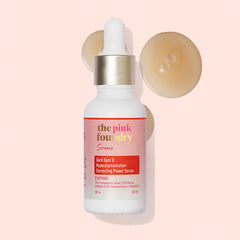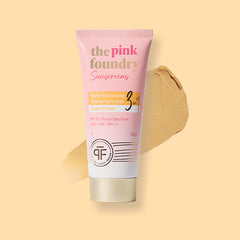Asiatic Acid in skincare

Introduction
Asiatic acid is a pentacyclic triterpenoid that has gained attention among skincare enthusiasts for its promising effects on the skin. It is found naturally in various plants and herbs, such as gotu kola, basil, sage, and rosemary. This article will help you explore the benefits and precautions of using skincare products containing this acid in detail.
What is Asiatic acid?
Asiatic acid is a type of triterpenoid found naturally in various plants and fruits. Some of the most common sources of this acid include Centella Asiatica, also known as gotu kola or Asiatic pennywort, as well as Asiaticoside plants like Bacopa Monnieri and Urtica Dioica, also known as stinging nettle.
Structurally, Asiatic acid contains several hydroxyl groups that enable it to neutralise free radicals and exert potent antioxidant effects. These ingredients are vital for getting radiant skin and preventing skin damage from UV exposure or pollution.
What does Asiatic acid do for the skin?
Topical application of skincare products containing this acid boosts collagen production, treats skin damage, reduces inflammation, heals wounds, and lightens pigmented areas. Asiatic acid is an all-around skincare ingredient.
- Aids collagen productionIncorporating Asiatic acid into your daily regimen can address multiple concerns at once. One of the primary benefits of this acid is its ability to enhance collagen production. Collagen is a protein in our skin that keeps it firm, smooth, and healthy-looking. Similar to the uses of centella asiatica, using this acid can help reduce wrinkles and fine lines by boosting collagen production. It also helps one improve skin's elasticity and strength.
- Neutralises free radicals in the skinAdditionally, Asiatic acid acts as an excellent antioxidant. This means it neutralises free radicals that damage skin cells through sun exposure, pollution, and other factors. Skincare products containing this acid help treat and protect against skin damage caused by these environmental factors.
- Clams irritation and acneSkincare products containing Asiatic acid also have natural anti-inflammatory properties. These properties make them useful for calming skin-related conditions like eczema, acne, and irritation and aiding the skin's healing process.
- Reduces pigmentationSkincare products containing Asiatic acid help lighten areas of pigmentation, such as brown spots and acne scars. They interrupt the production of melanin, which is responsible for skin discolouration and spots.
Asiatic acid benefits in skincare
Research shows that topically applying Asiatic acid has numerous benefits for skin health. This section will help you explore the most significant uses and benefits of this acid for skincare. Some of the important Asiatic acid skin benefits include the following:
1. Reduces wrinkles and fine lines
Asiatic acid stimulates collagen production in the dermis and epidermis layers of skin. With more collagen, skin becomes firmer, smoother, and more supple. Multiple studies confirm that using skin care products with this acid can significantly reduce the appearance of wrinkles and fine lines. It helps rejuvenate the skin by restoring elasticity.
2. Lightens hyperpigmentation
By interrupting the synthesis of melanin, Asiatic acid can lighten hyperpigmentation and unwanted spots on the skin. It also helps create a brightening effect by evening out the skin's tone and reducing tanning on the forehead and other areas prone to tanning.
3. Minimises scarring
Asiatic acid accelerates the healing of wounds. It minimises scarring through several mechanisms. It promotes new tissue growth, inhibits inflammation, and facilitates collagen. These properties make it helpful for reducing the appearance of acne scars, stretch marks, surgery scars, and more over time.
4. Treats skin damage
With its antioxidant and anti-inflammatory activities, Asiatic acid defends the skin against damage from UV radiation, pollution, and other external factors. It also promotes the healing of existing damage by increasing blood flow and stimulating cell renewal.
5. Moisturises skin
In addition to stimulating skin's natural moisture factors like hyaluronic acid, Asiatic acid has humectant properties to attract and seal in hydration. Applying skincare products containing this acid leaves the skin smooth, soft, and hydrated.
Asiatic acid is a powerhouse ingredient in skincare products, reducing wrinkles and lightening pigmentation. It can also help combat environmental damage, calm inflammation, and enhance skin elasticity, making it a must-have for anyone looking to elevate their skincare routine.
Is Asiatic acid natural?
Skincare products are mainly based on plant-based sources. This section will help you explore the top plant-based sources of this natural antioxidant:
1. Centella Asiatica (Gotu Kola)
Native to Asia, Centella Asiatica is one of the most common sources of Asiatic acid used in skincare products today. It contains asiaticoside, which converts to Asiatic acid in the skin.
Gotu kola extracts have many benefits. When applied topically, they support collagen production, treat hyperpigmentation, minimise scarring, and deeply hydrate the skin.
2. Bacopa monnieri
Also known as Brahmi, bacopa monnieri is an adaptogenic herb used in Ayurvedic medicines for skin and brain health. It contains high levels of Asiatic acid and related triterpenoid compounds. Bacopa is traditionally used to heal wounds, burns, and irritation. Modern research shows that its Asiatic acid content gives it skin benefits similar to those of gotu kola.
3. Stinging nettle
Nettle extracts have natural antihistamine and anti-inflammatory properties that benefit skin conditions like eczema or acne. The roots of the stinging nettle plant also provide Asiatic acid. Thanks to this acid and other bioactive compounds, stinging nettle supports the regeneration of skin cells and collagen production thanks to Asiatic acid and other bioactive compounds.
Precautions while using Asiatic acid on skin
While generally very safe and well-tolerated, it is important to be aware of certain precautions while using skin care products containing Asiatic Acid. Some of the essential precautions one could take while using these products include the following:
- Try avoiding skincare products containing Asiatic Acid during pregnancy.
- People with already-existing skin irritation, redness, or rashes should avoid using these products.
- People with sensitive skin should discontinue using these products if a reaction occurs.
- Too high concentration of this Acid in these products can cause skin dryness in some people.
- Not enough research yet on long-term use beyond 12 weeks
Importantly, it is better to start slowly when first using skincare products containing this acid and monitor the skin's response. This approach allows one to adjust usage frequency or concentration level if any irritation develops. Combining these products with other proven antioxidants like vitamin C or niacinamide can also help enhance skincare benefits.
Conclusion
With evidence of Asiatic acid's antioxidant and skin-healing properties, it is no wonder this plant compound is gaining popularity in skincare formulations. Adding products with gotu kola, bacopa, stinging nettle, or Asiatic acid can help visibly improve wrinkles, hyperpigmentation, skin moisture, and more.
The data in this guide can help readers learn if this acid may be right for their skincare needs. As always, when trying skincare products with new ingredients, introducing them slowly and paying attention to the skin's response can help them reap the desired benefits.
Related Blogs

Skin Minimalism: The Simple Skincare Routine You Need
TABLE OF CONTENTS What is Skin Minimalism? Benefits of Skin Minimalism Best Minimal Skincare Routine Skin...
Continue Reading
Ethyl Ascorbic Acid vs. L Ascorbic Acid: Which Vitamin C Form is Best for Your Skin?
TABLE OF CONTENTS Ethyl Ascorbic Acid vs L Ascorbic Acid: Key Differences Benefits of Each Form of Ascorbic Acid ...
Continue Reading
Best Anti-Aging Ingredients You Should Include in Your Skincare Routine
TABLE OF CONTENTS Best Anti-Ageing Ingredients for Skin How These Ingredients Work How to Use Anti-Ageing Ingredi...
Continue Reading
How Often to Use Salicylic Acid: Finding the Right Frequency for Your Skin
TABLE OF CONTENTS How Often Should I Use Salicylic Acid Serum? How Often to Use Salicylic Acid for Specific Skin Types ...
Continue Reading















